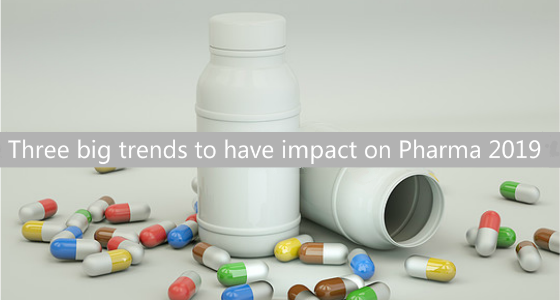Sarah HardingApril 09, 2019
Tag: pharma , innovation , Artificial Intelligence , 2019 , Bio-manufacturing
As we enter the second quarter of 2019, now seems a good time to pause and look at the topics that seem likely to cause the most buzz this year. It’s always difficult to pick just a few from the vast number of factors and trends influencing this fast-paced industry, but these are three big ones that I think could have a particularly interesting impact on Pharma this year: Innovation, Bio-manufacturing and Artificial Intelligence.

Innovation
A couple of years ago there were widespread concerns about the lack of innovation in the pharma industry. However, with 59 new molecular entities (NMEs) approved by the FDA last year, and 42 approved by the EMA, the tide appears to be turning. This might reflect an increase in collaboration between big pharma and contract manufacturing and development organizations (CDMOs), which are positioned to specialize with greater agility, allowing them to take advantage of novel technologies and methods that could enhance drug discovery and development more rapidly.
Schemes to incentivize industry may have also contributed to the high number of NMEs approved in 2018. Of note, nearly 20 of the 59 NMEs approved by the FDA were for oncology, possibly reflecting the Administration’s move to introduce less rigorous regulatory procedures for cancer drugs, encouraging an increased rate of innovation in this field. Further schemes are currently under discussion in the US for other therapeutic areas, such as the Re-Valuing Antimicrobial Products (REVAMP) Act, which offers companies a transferable certificate (i.e. one that can be applied to other, higher-value drugs) for extended market exclusivity following the approval of a new antibiotic. However, this scheme is yet to be approved by the US government.
Biomanufacturing
More companies are investing in large scale bio-manufacturing as biologics keep pace as the fastest growing sector in the pharmaceutical industry. Bristol-Myers Squibb, Novartis and Boeheringer Ingelheim are just three pharma giants who have made significant investments in this area in recent years, poised to take advantage of rapid market expansion.
There remain limited CDMO offerings in this area, as few companies have the resources to invest sufficiently in this area. However, WuXi Biologics, a leading global open-access biologics technology platform company offering end-to-end solutions for biologics discovery, development and manufacturing, announced at the end of 2018 that it is constructing a biologics manufacturing centre of excellence in the city of Shijiazhuang (near Beijing) in China. It will be the 8th drug substance manufacturing facility of WuXi Biologics, which plans to have more than 220,000L of manufacturing capacity by 2021.
A side effect of this increased focus on biologics is a re-alignment of small molecule supply networks, including the divestment of small molecule manufacturing facilities, as pharma giants evolve their manufacturing networks in alignment with their product focus and priorities.
Artificial Intelligence
Cited by Forbes as being one of the top healthcare predictions for 2019, the long-anticipated ear of artificial intelligence (AI) in healthcare is finally expected to take off this year, with the market for these applications predicted to exceed $1.7 billion.
As well as increasing enterprise efficiency with data collation and other ‘simple’ tasks, AI is expected to help companies leverage their assets by finding new targets for existing molecules, or identifying sub-populations that might respond to drugs that initially ‘failed’ in an overall patient population. It is also anticipated that AI will revolutionize original drug development, as programs will be able to ‘create’ new molecules from scratch and test them against computational models to make predictions of success. While this is still early technology, companies are already starting to invest in this type of approach, and it is expected that AI will evolve throughout 2019 as we begin to see fruition, especially in drug discovery and risk analytics applications.
Author biography

Sarah Harding, PhD
Sarah Harding worked as a medical writer and consultant in the pharmaceutical industry for 15 years, for the last 10 years of which she owned and ran her own medical communications agency that provided a range of services to blue-chip Pharma companies. In 2016, she began a new career in publishing as Editor of Speciality Chemicals Magazine, and has more recently taken up the role of Editorial Director at Chemicals Knowledge. She continues to also provide independent writing and consultancy services to the pharmaceutical and speciality chemicals industry.
-----------------------------------------------------------------------
Editor's Note:
To apply for becoming a contributor of En-CPhI.cn,
welcome to send your CV and sample works to us,
Email: Julia.Zhang@ubmsinoexpo.com.


Contact Us
Tel: (+86) 400 610 1188
WhatsApp/Telegram/Wechat: +86 13621645194
+86 15021993094
Follow Us:




 Pharma Sources Insight July 2025
Pharma Sources Insight July 2025


